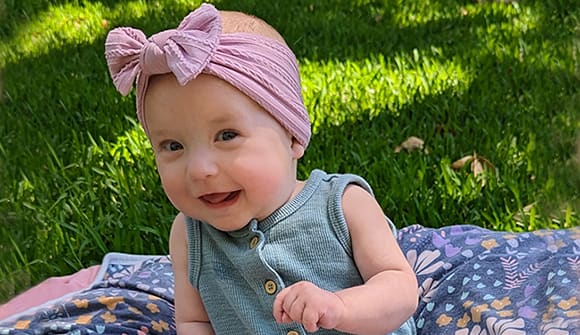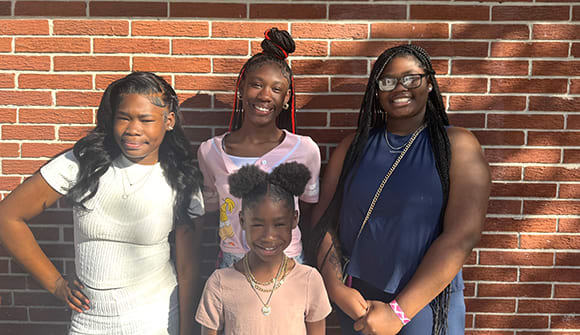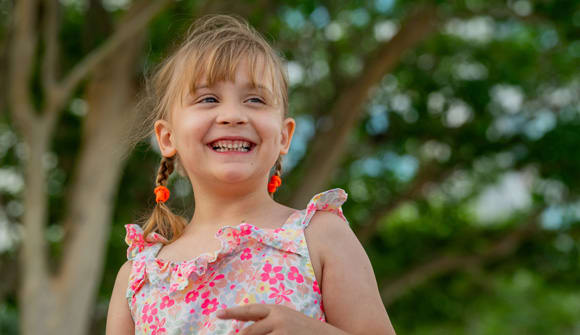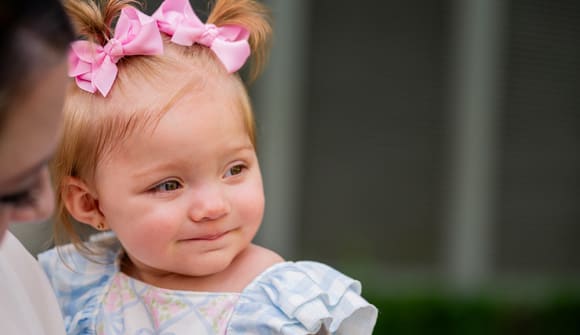A wildflower at heart
Baby Paisley thrives after diagnosis of rare heart, genetic disorders.
Article Date:

Just a couple months shy of Paisley Van Meter’s first birthday last August, her mom, Teresa, says her daughter’s spirit and spunk are as lively as ever, despite her prenatal diagnosis of a serious heart defect.
“The family calls her a wildflower. Despite how unlikely the soil and adverse the circumstances, Paisley blooms and blossoms,” Teresa said.
Double diagnosis
Teresa was 16 weeks pregnant when Rajesh Shenoy, MD, a fetal and pediatric cardiologist with Nemours Children's Health, Jacksonville, and medical director of the Wolfson Children’s C. Herman and Mary Virginia Terry Heart Institute, diagnosed Paisley in utero with a complex version of an already rare heart condition called tetralogy of Fallot.
“The artery supplying the left lung did not arise from the right ventricle like it should. Instead, it arose from the aorta. Knowing about this before birth helped the parents prepare for what Paisley would experience after birth and a longer hospital stay,” Dr. Shenoy explained.
As Teresa’s pregnancy progressed, Paisley was also diagnosed with a rare genetic condition called 22q deletion syndrome, which can affect any system of the body.
“Approximately eight in every 1,000 babies are born with a heart defect and about 25% of those patients have a critical congenital heart defect, which is what Paisley had,” said Dr. Shenoy. “While tetralogy of Fallot is the most common cyanotic heart defect [often called ‘blue baby syndrome’ due to skin coloring from low oxygen], involvement of the lungs, windpipe and food pipe is extremely rare.”
A wildflower blooms
Paisley was born in August 2022 at Baptist Medical Center Jacksonville and Teresa said the birth was as tumultuous as her pregnancy.
“Thankfully, Paisley was born pink, meaning her heart was circulating oxygen, and we got to spend a few short minutes with her before the neonatologist whisked her away. It was a moment we had been dreading for the last three months,” Teresa said.
Paisley spent the next two months in the Neonatal Intensive Care Unit (NICU) as Dr. Shenoy and other pediatric cardiologists, including Robert English, MD, continued to determine the best treatment and timing for Paisley to undergo her first surgery.
When Paisley was 38 days old, Dr. English performed a heart catheterization procedure to place a stent in the patent ductus arteriosus (PDA), a hole in the heart.
“Ordinarily, the PDA vessel closes after birth, but she needed hers to stay open because of her heart defect and the way blood flows into her lungs,” he explained. “The procedure was successful and allowed her to go home for a while, so she could get bigger and stronger before having her open-heart surgery to repair her defect.”
A week after the procedure, Paisley was finally able to go home and meet her 2-year-old brother.
Healing Paisley’s heart
In early 2023, Paisley began seeing pediatric cardiothoracic surgeon Michael Shillingford, MD, MBA.
“Once again, the terror we felt before her open-chest surgery was met with compassion. Dr. Shillingford and his team saw Paisley as a lively, curious and beloved child. They honored this with the same fierce commitment they had to the science of the medicine they practiced,” Teresa said.
On February 13, 2023, Paisley underwent complex surgery to repair her defects that included closing a large ventricular septal defect in her heart, re-attaching her misplaced left branch pulmonary artery and releasing a vascular ring encircling her trachea and esophagus.
“She had a great outcome and she recovered nicely. After a stay in our Cardiovascular Intensive Care Unit, Paisley was able to go home,” Dr. Shillingford said. “If left untreated, patients like Paisley would have a 50% mortality rate in two years. Because she was treated at a comprehensive pediatric heart center like the one we have at Wolfson Children’s Hospital, we expect Paisley’s future to be very bright.”
‘Endlessly grateful’
There are likely more procedures in Paisley’s future, including one to prevent her heart from enlarging. In addition, she will likely need a minimally invasive procedure to address scarring from her open-heart surgery. But, for now, Paisley continues to blossom, Teresa said.
“Our family is grateful for Dr. Shenoy, who has guided us through this journey from the beginning and continues to do so, and Dr. Shillingford, who fixed Paisley’s heart. From her primary NICU nurse who nurtured her fiercely, to the pediatric anesthesiologist who sweetly adored her and her pediatrician who ambitiously fights for her holistic well-being, Paisley has been gifted with protection for her precious life,” she said.
“Relying so deeply on medical professionals for the everyday care and survival of your child is incredibly humbling as a parent. We are endlessly grateful to the doctors and nurses who understand this vulnerability and see Paisley’s sacred humanity.”
The Wolfson Children’s Terry Heart Institute specializes in the diagnosis and treatment of congenital heart disease, heart rhythm disorders, and acquired heart conditions. Visit wolfsonchildrens.com/littlehearts or call 904.202.8550 for more information.



